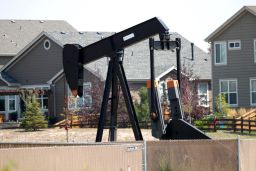Colorado’s flourishing oil industry could be dealt a powerful blow on Tuesday by voters worried about the safety and environmental side effects of the shale boom.
Proposition 112 calls for banning oil and gas companies from drilling any wells within 2,500 feet of occupied buildings, water sources and other “vulnerable” areas.
If approved, the ballot question would eliminate future drilling locations in a chunk of the surging Denver-Julesburg, or DJ, basin in Colorado, one of the nation’s largest oil-producing states. Much of the Colorado land held by oil companies like Anadarko Petroleum (APC) and Noble Energy (NBL) would suddenly be off limits to new drilling.
“The long-term impact of Proposition 112 on Colorado’s oil and gas industry would be dramatic,” Artem Abramov, head of shale research at Rystad Energy, wrote in a recent report.
No wonder the oil and gas industry has spent more than $30 million to defeat the ballot question.
‘Scary’ for companies
There has been limited public polling on Proposition 112, which has received the backing of Vermont Senator Bernie Sanders, an independent, and actor Leonardo DiCaprio.
A University of Colorado online poll showed narrow support for the ballot question that was barely within the margin of error. A mid-October poll by Height Capital Markets found that 43% of respondents support the measure, while 47% oppose. Height Capital sees a 20% chance of Proposition 112 passing.
“It’s going to be tight. It’s kind of scary for the companies,” said Katie Bays, an energy analyst at Height Capital Markets.
Even though Texas and North Dakota get most of the attention, Colorado’s oil industry is soaring thanks to the shale revolution.
The state’s production has quintupled over the past decade to a record-high 477,000 barrels a day as of August, according to federal government stats. Colorado only ranks behind Texas, the Gulf of Mexico, North Dakota, New Mexico and Oklahoma in terms of oil production.
Technological advances have opened access to oil resources that were previously trapped beneath the ground. Breakeven prices in the DJ basin have plunged from $80 a barrel in 2010-2011 to as low as $30 today, according to Rystad Energy.
The state’s oil and gas industry employs more than 100,000 workers, according to the Colorado Oil & Gas Association.
Oil output could be cut by 54%
But now environmental groups, led by Colorado Rising, are pushing to rein in the industry. They argue the current setback distance of 500 feet from homes and 1,000 feet from schools is not strong enough.
“I support Proposition 112 because it keeps our communities safe from the many serious dangers of drilling and fracking near homes, schools, hospitals, parks and water sources,” Julia Williams, volunteer coordinator at climate group 350 Colorado, said in an email.
Proposition 112 would have a dramatic impact on some companies’ Colorado business. Anadarko Petroleum, Extraction Oil & Gas (XOG) and PDC Energy (PDCE) have more than 90% of their acreage within the buffer zone that would be impacted, according to Rystad.
S&P Global Platts Analytics estimates that Proposition 112 would curtail oil production by 54% within five years. And more than three-quarters of Weld County, the production center of the DJ basin, would be rendered off limits to new oil and gas development, S&P said.

“It basically says we’re trying to run oil and gas out of the state of Colorado,” said Jeff Bush, president of CSI Recruiting, a Denver-based oil and gas recruiting firm.
Bush said that his firm would be “greatly impacted” by Proposition 112, which he described as “over-the-top.”
Anadarko warns of a shift
Oil companies have been racing to get approval to drill in Colorado ahead of the vote. There were 200 more drilling permits granted in Weld County in the third quarter of this year compared to the second quarter, according to Rystad.
Anadarko Petroleum warned last week that Proposition 112 might change how the company allocates capital in 2019.
“Regardless of what happens, we feel confident we can continue to deliver our expected 2019 result given the flexibility of our portfolio,” CEO R.A. Walker told analysts.
The company did not respond to a request for comment.
The Colorado Oil & Gas Association warned that Proposition 112 could “cripple” Colorado by costing the state 147,800 jobs.
“A half-mile setback is a blatant attempt by activists to ban oil and natural gas in Colorado and put working families on the unemployment line,” Dan Haley, CEO of the industry group, said in a statement released after the proposition was announced.
What about 2020?
If Proposition 112 passes, its impact would not be felt immediately. The major oil developers have a year or two worth of permits for projects that would still be allowed to go forward. However, Rystad estimates that DJ oil production would peak in early 2021 and fall below current levels by 2023-2024 if the measure is successful.
Even if Big Oil wins on Tuesday, a close vote could force the industry to find a compromise with Denver to restore confidence among shaken investors. Otherwise they run the risk of a similar proposal returning in two years when Democratic turnout will likely be even higher.
“The cards may fall differently in 2020 when Donald Trump is on the ballot again,” said Bays, the Height Capital analyst.





















